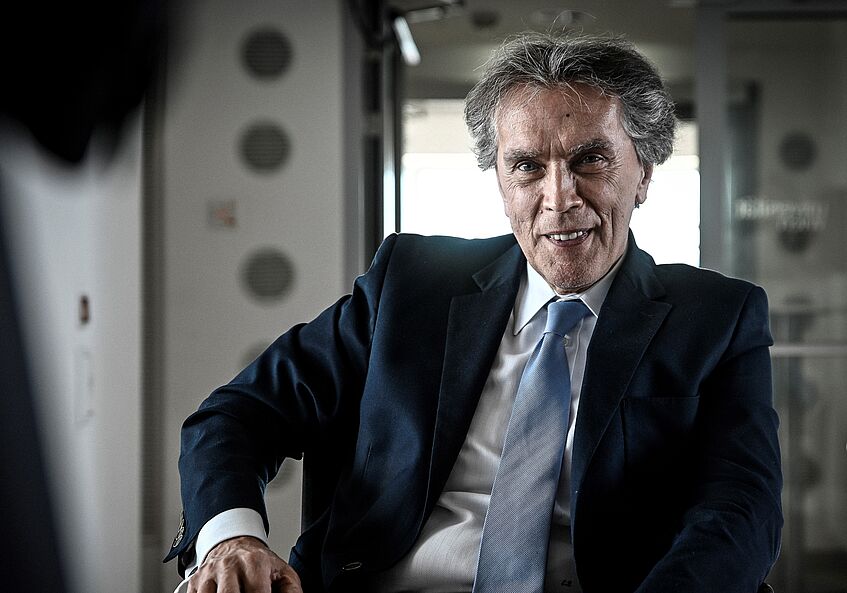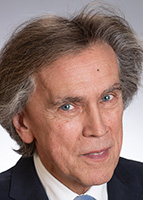Will the tragedy of Central Europe repeat itself?

Will the tragedy of Central Europe repeat itself?
CENTRAL Network talked to Ambassador Emil Brix about the relations between Central Europe and Russia and what cooperation options there can still be after the war against Ukraine. Ambassador Brix gave a keynote speech at the panel discussion War in Ukraine: a turning point for the relationship between Central Europe and Russia? on June 2.
Ambassador Brix, February 24, 2022 marked a change in Europe's relations with Russia. Before that, there was a period of economic integration and a hope for peaceful, prosperous neighbourly relations. This hope seems to have been destroyed. How do you see the further development of Europe's relations with Russia?
February 24 was a decisive turning point in the relations between Europe and Russia. The reason for this was that it marked the destruction of the hope that through close cooperation – between universities, civil society, but also economic partners – we could achieve a reasonable relationship between Russia and Europe. The war of aggression is proof that one side does not want that. Therefore, we have to assume that a rather impenetrable new wall is being created here in Europe between Russia and the rest of Europe. And this also raises the question: what does this mean for Central Europe, for those states that are relatively recent members of the European Union, that have had decades of experience with communism, with the Soviet Union? To what extent have these countries now become a region in Europe that can, on the one hand, help us to understand what's going on; and on the other hand, actually help us defend what European values are?
Apart from Central and Eastern Europe, you were also stationed in Russia as a diplomat, so can you assess what this ultimately means for Russia too?
The war is a decisive turning point for the Russian side as well. It is to be expected that the result of this war will be a weak, isolated Russia – both politically and economically, but also in terms of cultural and scientific links. It is true that many people are trying to maintain contacts as far as possible – and rightly so, as far as they are not politically driven – but this will only be partially successful, and we can expect to see even stronger nationalism on the Russian side. The leadership in the Kremlin in Moscow has decided to stake everything on this approach: isolation, military strength and strong control of its own population. Apparently, it accepts that this will bring disadvantages for the Russian population as a whole.
What is driving Russia, and are official Russia and the Russian population on the same page?
For years now, only the official depiction of what drives Russia and what its interests are has existed. Everything that we understand by the term “civil society” has been systematically dismantled and banned in recent years. If you ask me what arguments the official leadership uses, they see the West as an ideological enemy that no longer upholds anything that remains in terms of traditional values. And official Russia casts itself as the preserver of traditional values – family, religion, gender roles – and this is currently supported by a majority of the Russian population; the polls are quite clear on that. But this strong focus on a 'different civilization', a different worldview, is certainly not undisputed in Russia. Too much has happened since the Soviet Union in terms of modernization, opening up, and scientific contacts. Many people have emigrated in the wake of February 24, but many are still there. In order to avoid putting themselves in danger, they have to stand back and wait a bit to see what can be done publicly. However, we have opportunities to continue to work together on both sides here. Science and culture in particular are predestined to do this. In the long term, we need this contact – for historical, cultural, geographical and human reasons.
Does this mean that calls to break off academic relations and expel Russian cultural workers are actually the wrong way to go, and these channels should remain open?
We should maintain contacts on the cultural and scientific level as much as possible. However, certainly not with those who have been in solidarity with the Kremlin's policy explicitly and for a long time. I am very much in favour of us taking a clear position here. That is actually what everyone in Europe has done. Even we at the Diplomatic Academy have suspended official contact with the leading Russian academy. Nevertheless, we did not send the Russian students home.
Europe has shown itself to be quick and surprisingly united in its support of Ukraine. However, there are fault lines too now; there is disagreement even among the Visegrád states. Do you see the danger of a split due to these fault lines?
I would put it positively: it is actually a miracle that we have so far managed to get far-reaching sanctions packages against Russia, against this war, off the ground with relatively little discussion. It's a real miracle that we've managed to get arms financing through a resolution in the European Union. So there's a lot of positives here. I think that perceptions of Poland, for example, which have been very negative in recent years, are changing as we see how they deal with refugees from Ukraine. Or think about Lithuania. They were the first European state that not only recognized the energy dependence on Russian oil and gas, but also did something about it by building an LNG terminal in 2014 to provide exactly this alternative to Russian gas, and today they are a role model with that. And it’s a Central European state that has done this, not one of the rich Western European states. That means there are very many positive contributions that Central European states are making in this dangerous situation.
At the same time, however, we also have Central European states that tend to put on the brakes – and in some cases only because of economic considerations.
In a state of emergency, as this war is for a region like Central Europe, it is very understandable that you look at your national situation first. In Austria, we say that security of supply is the most important thing as far as energy issues are concerned. The Hungarians say that national patriotic unity must not be endangered and that we have to look after our minorities in Ukraine. So each of the Central European countries is directly affected, and most of them are more affected than Portugal, Spain or France. This means you have to understand that the situation is really different. I don't think that the political climate of opinion at the moment sees the Central European region as having a destructive role. On the contrary, I believe that people are now beginning to understand what the historical experience of these Central Europeans, who for decades were largely under the Soviet yoke, actually means. Because this didn’t just mean that they had to orient themselves symbolically towards the East, but that they had to orient themselves with pipelines and other energy supplies towards this direction and make themselves dependent. After all, this was not a voluntary decision in many states. And I think it is a positive contribution to European solidarity that these Central European states now have to engage much more intensively with the question of how they stand between the West and the East.
Does that mean that this situation also offers an opportunity?
Absolutely, it also offers an opportunity. I'm calling my presentation in the upcoming panel discussion, 'Is Russia again the tragedy of Central Europe?' because this title is from an essay by Milan Kundera from 1984. In this essay, he describes how dangerous Russia can be, but in the end it's not about Russia at all. It's about the fact that on the European side, nobody is willing to stand up for European values anymore; that the Central Europeans talk about Europe, especially the dissidents before the end of the Soviet Union, while in (editor’s note: Western) Europe these European values are no longer talked about.
What is your assessment of this? What would be needed for these discussions about the Central European view of European values to work? Do we need a Europeanization of the media, so that people know much more about what is currently being discussed in Prague, Budapest and Vienna?
If we want to make progress in the discussion about Europe, there are essentially three points: do we have a European people that can express itself through representative elections? We're not very far along that road yet. Do we have a common level of communication in Europe? The fact that everything is translated into all official languages in Brussels is simply not enough. And the fact that there are practically no pan-European newspapers is not enough either. Social media offer a certain opportunity, despite all the negative consequences, because they are generally not restricted to a national level. And the third is the security component: the discussion about a European army must be addressed. This is a question of European geopolitical sovereignty. But this third major area is also just beginning. So my very personal assessment is: we should definitely give Ukraine candidate status (editor’s note: for EU membership) as soon as possible; that would be a strong European signal.
Ambassador Brix, thank you very much for the interview. We are looking forward to your keynote on June 2.
The interview was translated by the International Office.
Panel Discussion
"War in Ukraine: a turning point for the relationship between Central Europe and Russia?"
June 2, 2022
16.30 - 18.30
Sky Lounge, Oskar-Morgenstern-Platz 1, 1090 Vienna

Ambassador Emil Brix
Dr. Emil Brix, born 1956 in Vienna, diplomat and historian, is the Director of the Diplomatische Akademie Wien – Vienna School of International Studies since 2017. After joining the Austrian diplomatic service in 1982, Mr Brix worked as political secretary for the parliamentary group of the Austrian People’s Party. In 1986, he was appointed Head of Cabinet at the Ministry of Science and Research. From 1990 until 1995, he served as Austrian Consul General in Cracow, Poland. Subsequently, he was Director of the Austrian Cultural Institute in London, a position he held for four years. In 2002, Mr Brix was appointed Director-General of Foreign Cultural Policy at the Ministry for European and International Affairs of Austria. After serving five years as the Austrian Ambassador to the UK from 2010-15, he became Austrian Ambassador to the Russian Federation in 2015. He is deputy chairman of the Institute for the Danube Region and Central Europe and member of the governing board of the Austrian Research Association. He holds a PhD from the University of Vienna and was awarded Dr. hc. by the University of Drohobytsch, Ukraine and by the University of Cluj-Napoca, Romania. He is an alumnus of the Diplomatische Akademie Wien and published numerous books and articles on Austrian and European history of the 19 th and 20 th century.
